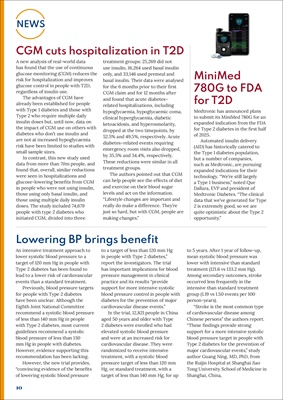
10
NEWS
CGM cuts hospitalization in T2D
A new analysis of real-world data
has found that the use of continuous
glucose monitoring (CGM) reduces the
risk for hospitalization and improves
glucose control in people with T2D,
regardless of insulin use.
The advantages of CGM have
already been established for people
with Type 1 diabetes and those with
Type 2 who require multiple daily
insulin doses but, until now, data on
the impact of CGM use on others with
diabetes who don't use insulin and
are not at increased hypoglycaemia
risk have been limited to studies with
small sample sizes.
In contrast, this new study used
data from more than 70m people, and
found that, overall, similar reductions
were seen in hospitalizations and
glucose-lowering benefits from CGM
in people who were not using insulin,
those using only basal insulin, and
those using multiple daily insulin
doses. The study included 74,679
people with type 2 diabetes who
initiated CGM, divided into three
treatment groups: 25,269 did not
use insulin, 16,264 used basal insulin
only, and 33,146 used premeal and
basal insulin. Their data were analysed
for the 6 months prior to their first
CGM claim and for 12 months after
and found that acute diabetes-
related hospitalizations, including
hypoglycaemia, hypoglycaemic coma,
clinical hyperglycaemia, diabetic
ketoacidosis, and hyperosmolarity,
dropped at the two timepoints, by
52.5% and 49.5%, respectively. Acute
diabetes-related events requiring
emergency room visits also dropped,
by 35.5% and 34.4%, respectively.
These reductions were similar in all
treatment groups.
The authors pointed out that CGM
can help people see the effects of diet
and exercise on their blood sugar
levels and act on the information.
"Lifestyle changes are important and
really do make a difference. They're
just so hard, but with CGM, people are
making changes."
Read more, CLICK HERE.
Lowering BP brings benefit
An intensive treatment approach to
lower systolic blood pressure to a
target of 120 mm Hg in people with
Type 2 diabetes has been found to
lead to a lower risk of cardiovascular
events than a standard treatment.
Previously, blood pressure targets
for people with Type 2 diabetes
have been unclear. Although the
Eighth Joint National Committee
recommend a systolic blood pressure
of less than 140 mm Hg in people
with Type 2 diabetes, most current
guidelines recommend a systolic
blood pressure of less than 130
mm Hg in people with diabetes.
However, evidence supporting this
recommendation has been lacking.
However, the new trial provides,
"convincing evidence of the benefits
of lowering systolic blood pressure
to a target of less than 120 mm Hg
in people with Type 2 diabetes,"
report the investigators. The trial
has important implications for blood
pressure management in clinical
practice and its results "provide
support for more intensive systolic
blood pressure control in people with
diabetes for the prevention of major
cardiovascular disease events."
In the trial, 12,821 people in China
aged 50 years and older with Type
2 diabetes were enrolled who had
elevated systolic blood pressure
and were at an increased risk for
cardiovascular disease. They were
randomized to receive intensive
treatment, with a systolic blood
pressure target of less than 120 mm
Hg, or standard treatment, with a
target of less than 140 mm Hg, for up
to 5 years. After 1 year of follow-up,
mean systolic blood pressure was
lower with intensive than standard
treatment (121.6 vs 133.2 mm Hg).
Among secondary outcomes, stroke
occurred less frequently in the
intensive than standard treatment
group (1.19 vs 1.50 events per 100
person-years).
"Stroke is the most common type
of cardiovascular disease among
Chinese persons" the authors report.
"These findings provide strong
support for a more intensive systolic
blood pressure target in people with
Type 2 diabetes for the prevention of
major cardiovascular events," study
author Guang Ning, MD, PhD, from
the Ruijin Hospital at Shanghai Jiao
Tong University School of Medicine in
Shanghai, China,
To find out more, CLICK HERE.
MiniMed
780G to FDA
for T2D
Medtronic has announced plans
to submit its MiniMed 780G for an
expanded indication from the FDA
for Type 2 diabetes in the first half
of 2025.
Automated insulin delivery
(AID) has historically catered to
the Type 1 diabetes population,
but a number of companies,
such as Medtronic, are pursuing
expanded indications for their
technology. "We're still largely
a Type 1 business," noted Que
Dallara, EVP and president of
Medtronic Diabetes. "The clinical
data that we've generated for Type
2 is extremely good, so we are
quite optimistic about the Type 2
opportunity."
To find out more, CLICK HERE.